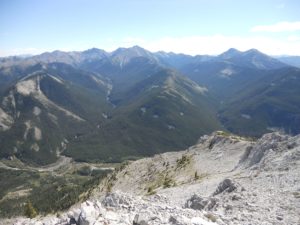 As we took the final steps to crest Badger Pass, a freight train of wind blasted through us, turning hoods inside out, slicking hair back, and freezing hands blue with cold. We had finally made it –on day 3 of 9- to the top of our first vista in the Badger Two Medicine wilderness in the Rocky Mountain Front Range. Standing amongst the ancient and gnarled Whitebark Pine, I saw smiles erupt on each and every face, a scene so perfectly lit with the late summer sun and a backdrop made up of the fabled Bob Marshall Wilderness complex, perhaps the most remote and rugged landscape in the lower 48.
As we took the final steps to crest Badger Pass, a freight train of wind blasted through us, turning hoods inside out, slicking hair back, and freezing hands blue with cold. We had finally made it –on day 3 of 9- to the top of our first vista in the Badger Two Medicine wilderness in the Rocky Mountain Front Range. Standing amongst the ancient and gnarled Whitebark Pine, I saw smiles erupt on each and every face, a scene so perfectly lit with the late summer sun and a backdrop made up of the fabled Bob Marshall Wilderness complex, perhaps the most remote and rugged landscape in the lower 48.
On that September afternoon, the wind blew something more than just a chill into my bones. Some might call it deja-vu, others a waking dream. What I felt was something deeply embedded in body, something written into my DNA, something that the wild landscape that was spread out in front of me unlocked and let leap out. It was pure Nirvana. Genuine enlightenment. A resounding state of bliss, traced back to origins of humanity.
Wilderness is my church. My holy place. My sanctuary. And I’m not alone in this feeling. All human beings thrive off the wonder of the wilds. Humanity’s roots are planted far more firmly in a natural landscape than even the sturdiest skyscraper’s foundation. Our connection with the land has been developed over hundreds of thousand of years, dwarfing the short time we’ve locked ourselves up in an industrialized landscape. We all rely on nature- and not just for sustenance. There have been scores of psychological studies done around the world, all of which starkly suggest our mental well-being relies on the natural world. Our minds thrive out in the deep woods and high atop mountains.
Searching back through the halls of time, two characters stick out in my mind when it comes to wild lands. Gifford Pinchot- the first leader of the U.S. Forest Service, and John Muir- the rucksack wanderer of the American West. Both heavily advocated for conservation of America’s wild lands- but both with different motives.
Pinchot wanted to conserve the commodities that lie within the West’s land, like timer and minerals. No wonder the Forest Service is in the Department of Agriculture. Muir, on the other hand, wanted to preserve the land for its natural wonderment, its beauty, and mans deep affinity towards it. Two faces of conservation- and two different philosophies. Utility, and spirituality.
What we need out West in Montana is a balance of both views on conservation. Currently, there are three basic divisions of landscape types. Much of the land is taken up by civilization, a fact of global population that must simply be accepted. Then, there are the wilds. This is land designated Wilderness, with a capital W, land left completely untouched by man. And in the middle, there are buffer zones between mankind and the wilds, known as our National Forests. Its these lands that Pinchot preached about- mostly uncivilized land that provides a stable commodity base of resources.
By dividing the land, we can still function as a working ecological sensitive society. In our travels along the Rocky Mountain Front, I got to see this division put into practice. Out in the Bob, the landscape was completely undeveloped. The land was pure and untrammeled from any anthropogenic influence. On the federal and private land along the plains of the Front, there are numerous energy development sites, mainly oil wells pumping up the same stuff that powered our car to the trailhead. Attempts have been made to drill for oil in the Badger Two Medicine and the Bob Marshall, but most of which have never been fully developed or supported. And that’s the way it should stay. We need not let our lust for natural resources come to be a part of every piece of land in the West.
Towards the end of the 9th and final day in the Badger Two Medicine, I had mixed feelings about returning back to the civilized world. Part of me wanted to stay in the woods, running wild amongt the Lodgepole and Cottonwood without a civilized care in the world. But the other side of me longed for a hot shower, a fresh meal, and a simple water faucet. If anything, my journey onto the wilds helped me see the good in both worlds. We need resources from the land, but not more so than we need the pure and undeveloped Wilderness. Nature created man, and no matter what, the wilds will always have the final word.